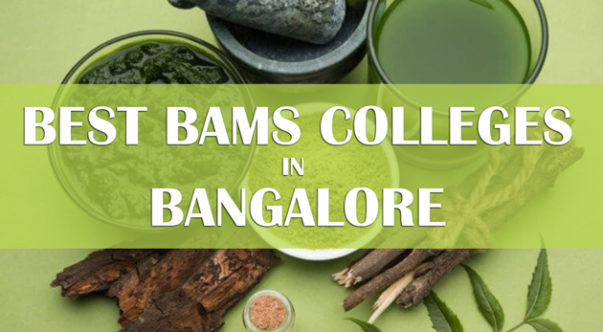Best Bachelor of Ayurvedic Medicine and Surgery (BAMS) Colleges In Bangalore – Course Overview, Eligibility
Best Bachelor of Ayurvedic Medicine and Surgery (BAMS) Colleges In Bangalore – Course Overview, Eligibility
Bachelor of Ayurvedic Medicine and Surgery
Before we jump right into the course details, let’s talk a little bit about Ayurveda. This step is important because this is going to help you decide whether or not Ayurveda is your cup of tea.
Ayurveda (origin of which is India) is one of the most ancient systems of medicine in the world. It is widely practiced in countries like India, Nepal, and Srilanka. Ayurveda is a Sanskrit word which can be split into two words “Ayus,” meaning life and “Veda,” meaning sacred knowledge. And thus Ayurveda literally means “Sacred Knowledge of Life.” It’s timeless wisdom and knowledge makes it relevant and fit to practice even in today’s world.
Ayurveda is a holistic approach to perfect health and overall well being. It rejuvenates, cures and prevents the recurrences of the diseases. Ayurveda emphasizes the balance of three humours, namely Vata (air), Pitta (bile) and Kapha (phlegm). A person with a perfect balance of all three substance is said to be perfectly healthy. Imbalance of any of these humours (Dosha) is the root cause of all sorts of diseases. And thus Ayurvedic treatments are primarily focused on achieving a perfect balance between the three humours.
Unlike the modern medical system, it not only cures the symptoms but the actual root cause of the diseases. Ayurvedic treatments are not solely based on medicines and surgeries but also therapies like panchakarma, massage, etc. To enhance the natural healing capacity, it stresses the importance of dinachary (daily activities) which includes yoga (exercise), diet, etc. Most therapeutical medicines are a combination of herbal compounds, minerals, and metal humours.
Does the idea of studying/practicing Ayurveda sound cool? If yes, please continue reading. The very first step to becoming an Ayurveda practitioner is to earn an undergraduate degree certificate in Ayurvedic medicine and surgery called BAMS (Bachelor of Ayurvedic Medicine and Surgery.)
Here’s all you need to know about BAMS.
Course Overview
BAMS aka Bachelor of Ayurvedic Medicine and Surgery is an undergraduate degree programme aimed to provide profound knowledge and extensive practical training in Ashtanga Ayurveda integrated with scientific advances in modern medicine. The Central Council of Indian Medicine (CCIM) is the only regulatory body that administrates Ayurvedic education in India. Consequent paragraphs are all in accordance with CCIM.
On successful completion of the degree, the graduates are awarded the title “Ayurvedacharya.” Just like MBBS graduates names are prefixed with the title Dr (Doctor), Ayurvedacharyas’ names are prefixed with title Vr (Vaidhyar) as a sign of respect.
Eligibility
- 12th pass with minimum 50% with physics, chemistry, and biology as compulsory subjects. (Although having studied Sanskrit is not a mandatory requirement, it surely is an added advantage as the course involves studying quite a few Sanskrit verses.)
- For reserved category or special category, relaxation on cut off marks may be considered.
- Admissions in most top colleges are made purely on the ranks secured in state-level/national level medical or AYUSH entrance tests along with 12th
Popular Entrance Exams To Get Into Best BAMS Colleges:
- NEET National Eligibility and Entrance Test
- Common Entrance Test or CET Karnataka
- AP EAMCET – Andhra Pradesh Engineering, Agriculture, and Medical Common Entrance Test
- KLEU AIET – KLE University
- KEAM (Kerala Engineering, Agriculture and Medical
- TS EAMCET – Telangana Engineering, Agriculture and Medical Common Entrance Test
- National Institute of Ayurveda Entrance exam (NIA)
- Assam CEE – Assam Combined Entrance Examination
Fees
- Government colleges – 5,000 INR to 10,000 INR per annum
- All India Quota in Private Colleges – 50,000 INR to 2,00,000 INR per annum
- Management Quota in Private Colleges – 2,00,000 INR to 5,00,000 INR per annum
Note: Above mentioned fees are only approximate values. It may be higher or lower depending on the colleges.
Duration and division of the course
If the student clears all the examinations in the first attempt, it takes 5 Years and 6 months to complete the course. 9 Years is the maximum duration given to complete the course. out of Five and a half years, 4 years and 6 months are dedicated for academic studies and 1 year for internship. The course is divided into five sections as shown below
- Twelve months for First Professional
- Twelve months for Second Professional
- Twelve months for Third Professional
- Eighteen months for Final Professional
- Twelve months for Compulsory Rotatory Internship
Scheme of Examination
- Examinations are conducted at the end of each professional studies.
- While the first, second and third professional exams are conducted in the month of May or June, the fourth professional exam is conducted during the month of October or November.
- Students failed in first professional exams shall be allowed to write second professional exams but not third and fourth.
- The same applies to the students failed in second and third professional exams. They are allowed to appear for immediate next exams but not any further.
- Students failed to clear any of the four professional exams in four attempts within three years are terminated from the course.
- Only after clearing all professional exams within a period of maximum 9 years, one is eligible to proceed to compulsory internship programme.
Subjects and Syllabus
-
First Professional
First professional deals with subjects like anatomy and physiology along with history and introduction of Ayurveda and Sanskrit, designed to build a solid foundation. Following are the subjects thought during the first
-
- Padarth Vigyan evam Ayurved Itihas
- Sanskrit
- Kriya Sharir (Physiology)
- Rachana Sharir (Anatomy)
- Maulik Siddhant evam Ashtanga Hridaya (Sutra Sthan);
-
Second Professional
Second professional subjects are mostly related pathology and pharmacology. Following are the subjects thought during the second
-
- Dravyaguna Vigyan (Pharmacology and Materia Medica);
- Rasashastra evam Bhaishajya Kalpana (Pharmaceutical Science)
- Roga Nidan evam Vikriti Vigyan (Diagnostic Procedure and Pathology)
- Charak Samhita-Purvardh (an ancient Ayurvedic text, Part -I)
-
Third Professional
Third professional deals with advanced subjects like pediatrics and gynecology. Following are the subjects thought during the third
-
- Agad Tantra Vyavahar Ayurveda evam Vidhi Vaidyaka (Toxicology and Medical Jurisprudence)
- Charak Samhita-Uttarardh (an ancient Ayurvedic text, Part -II)
- Swasthavritta and Yoga (Preventive and Social Medicine and Yoga)
- Prasuti evam Striroga (Obstetrics & Gynaecology)
- Bal Roga (Paediatrics)
-
Fourth Professional
The fourth professional is the final academic part of the course dealing with subjects like ENT, general surgery and research methodologies. Following are the subjects thought during fourth professional.
-
- Shalya Tantra (General Surgery)
- Shalakya Tantra (Diseases of Head and Neck including Ophthalmology, Ear, Nose, Throat, and Dentistry)
- Kayachikitsa (Internal Medicine-including Manas Roga, Rasayan, and Vajikarana)
- Panchakarma
- Research Methodology and Medical-statistics;
Scope and Job Opportunities
Sope for the BAMS graduates is not just limited to practice as an Ayurvedic physician. There are several industries wanting to hire BAMS graduates. Education institutes, government and private hospitals, pharmaceutical industries, research institutes, healthcare industries, spa are but to name a few employment areas.
List of Job roles for BAMS graduates
- Ayurveda Physician
- Ayurveda Consultant
- Therapist
- Pharmacist
- Medical Representative
- Asst Researcher
- Lecturer/Asst. Professor
- Health Supervisor
- Nutritionist
Studying further definitely broadens the scope. For, eg, Post graduation degree specialized in Ayurvedic subjects promotes you to a higher profile like a scientist, researcher and a professor for UG courses in Ayurveda. MBA courses like MBA in Hospital and Healthcare Management give you the gateway to enter into management domains which in turn unlocks management job roles in hospitals and healthcare institutes.
Best BAMS College in Bangalore
- Hillside Ayurvedic Medical College and Hospital
- Ramakrishna Ayurvedic Medical College
- Atreya Institutions
- SMD Institute of Ayurveda and Hospital
- Government Ayurvedic Medical College
- Sri Sri College of Ayurvedic Science and Research
- Indian Institute of Ayurvedic Medicine and Research (IIAMR)
- Shushrutha Ayurvedic Medical College and Hospital
Top BAMS College in India
- Rajiv Gandhi University of Health Sciences, Bangalore
- Shri Dhanwantri Ayurvedic College, Chandigarh
- Gujarat Ayurved University, Jamnagar
- Ayurvedic Medical College, Kolhapur
- State Ayurvedic College of Lucknow
- Rishikul Government PG Ayurvedic College & Hospital, Haridwar
- Shri Ayurveda Mahavidyalaya, Nagpur
- Asthang Ayurveda College, Indore
- Dayanand Ayurvedic College, Jalandhar
- National Institute of Ayurveda, Rajasthan





One thought on “Best Bachelor of Ayurvedic Medicine and Surgery (BAMS) Colleges In Bangalore – Course Overview, Eligibility”
Excellent post. I definitely appreciate this website. Continue the good work!